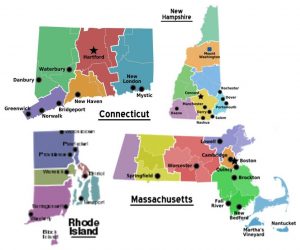As I have often mentioned, the solar installation process can at times be fairly maddening (see The Five Stages of a Solar Installation, Parts 1, 2, and 3). That’s partially because it is more of a major construction project than initially meets the eye, but mostly because there are so many players involved in the process.

There are your town’s rules and regulations, the utility’s, and in many cases some sort of incentive program requirements we all need to follow. That’s three maybe four powerful entities that have a say in what your system can consist of and what rules and regulations it has to meet.
But, if you’ve looked at even a few of those rules in the past, you might wonder “isn’t there one entity or “thing” that ultimately has the power to control most or even all of those directives?”
Well, the answer is yes. That entity is your state’s government; generally starting with the legislature, but also your governor. If something should change, it is generally your state government that needs to do the changing.
What Does My State Government Decide
 The list of what your state government decides is very long, but when it comes to solar you’d be surprised how close the list comes to “pretty much everything important”.
The list of what your state government decides is very long, but when it comes to solar you’d be surprised how close the list comes to “pretty much everything important”.
That’s because your utility, as a “natural monopoly,” is controlled by the state government. The only real exceptions to that rule are towns that have municipal utilities, in which case your utility is controlled by your town’s government – or in most cases directly elected directors. (But obviously, that just makes the “who sets the rules” answer even closer to home.)
As an example, your state representatives control your net metering rules and regulations. So if you live in Massachusetts and would like a home system with full net metering and more than a 10 kW AC inverter the folks you need to speak with are your state representatives. The same goes for people in RI who might not like the “3 years of history” rule for setting a maximum system size. Or, in a similar vein, residents of NH or Maine that might like a state incentive program also need to speak to their representatives.
Getting involved is also pretty easy; just make some phone calls, or send a letter, and pretty much make sure your voice is heard (many state politicians tell us that emails are not as persuasive as phone calls and letters). Yes, states are increasingly setting big clean energy goals for a carbon-free (and more sustainable and cheaper) energy future, but from our way of thinking that’s the easy part of the battle. The real work is making “on the ground” changes to make those solar generation goals actually possible.
Who Is Your Representative?
Figuring out who your representatives are is also pretty easy. There is no doubt a website hosted by your state I’m sure you can find. But if you prefer, there is a site that works for every state here. Just enter your address and it’ll give you their names and have a click through to their contact information.
Remember, it is important to vote, but it is also important to make your voice heard!





No comments yet. You should be kind and add one!
The comments are closed.